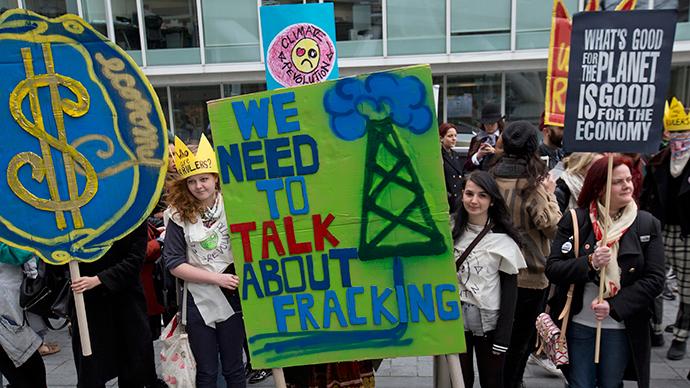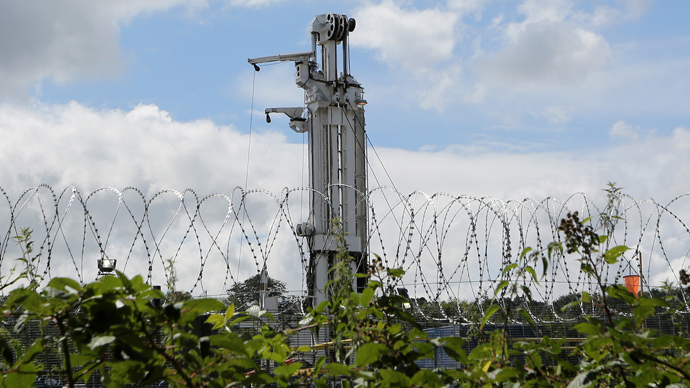UK enslaved to money... and fracking

William Blake was thinking of Jesus when he wrote these seminal words, but many English rural dwellers are thinking of Blake's prose now as fracking threatens to come to Albion's countryside.
And did those feet in ancient time
Walk up England’s mountain’s Green
And was the holy lamb of God,
On England’s pleasant pastures seen?
- And did those feet in ancient time.
(William Blake, 1757-1827)
The next verse of Blake’s work, often referred to as England’s “national poem,” asks “And was Jerusalem builded here, Among these dark Satanic Mills.’
The ‘dark Satanic Mills’ that Blake referred to are generally interpreted as describing the early Industrial Revolution’s destruction of Britain’s once pristine countryside. Blake had a serious aversion to cotton mills and the environmental damage they wreaked. He also believed they enslaved workers.
The modern UK is enslaved too, but to money, and recent policy choices in London are designed to destroy more “pleasant pastures” to obtain filthy lucre from a controversial practice called hydraulic fracturing, or fracking. With the Scottish oil and gas fields almost depleted and Scotland’s very place in the UK in doubt, fracking has the potential to generate trillions of pounds of liquid gold and energy security for the country, or what's left of it.
It’s not a new technology (it was first attempted as long ago as the 1860s), but it’s only in the last two decades that it’s been perfected and it wasn't until the last few years that it became economically viable.
With the nation’s GDP only recently returned to pre-Lehman’s levels and doubts that the recovery is even genuine and not a mirage created by printing money, the UK urgently needs something to generate real growth. Given that the industrial base has been gutted and the country is largely dependent on London’s financial industry to pay the bills, the bean counters and politicians have apparently decided that fracking is the answer to their prayers.
The potential sums involved are huge. The British Geological Survey estimates that 1,300 trillion cubic feet (37 trillion cubic meters) of natural gas is trapped in shale rock beneath northern England alone. To give an idea of the value of this hidden treasure, Western Europe’s biggest gas producer, Norway, has only 73 trillion cubic feet (2 trillion cubic meters) in proven reserves. But they are proven and are accessible, whereas this information on the UK is just an estimate.
Another report looked at southern England and found the potential for billions of barrels worth of shale oil. The UK is currently down to its last 3 billion barrels in proven reserves – and they are in troublesome Scotland.
The other side of the coin
Sounds great so far, right? Yes, but here’s a problem which I am about to get to. To maneuver around this quandary, the London authorities have been working hard to change the laws to avoid costly legal challenges. Indeed, the government’s legislative program, contained in the annual Queen’s Speech, was most recently used to support changes to trespass regulations which would force landowners to permit drilling under their land. Locals would get £20,000 ($34,000) for each well drilled.
So what is the problem? The first potential snag is that nobody is actually sure if this is all a wishful thinking or a realistic business model. In fact, nobody has proven that the reserves are commercially viable – and there is also the problem that another European country, Poland, has gone down this road with disastrous results. The Poles thought they too had struck a bonanza, but when they went to drill this “El Dorado” the fractures in the rock quickly closed, gas flow was restricted to a trickle and almost every company of note has packed up and gone home.
The Polish get-rich-quick scheme has turned into their version of the Sagrada Familia Cathedral – a Barcelona landmark that Gaudi began constructing in 1883 and which still hasn't been completed. Spain hopes to complete the building in time for the centenary of Gaudi's death in 2026 and at current levels of progress Poland might be waiting as long to see some return on its shale investment.

There is another potential landmine for this Blackadder-like “cunning plan.” The fact that 53 million people already live in England and that the country is about the same size as the US state of Louisiana, which has a population of 4.5 million. That’s a lot of people in a small space, and most of them live rather close to potential fracking sites.
In fact, all 10 of the UK’s largest cities and 10 of the 13 national parks are included in the list of possible locations. There is a saying that you are never more than a few meters from a rat in London – if this “revolution” comes to pass, not many English residents might be more than a few miles from a fracking well. Understandably, a lot of Brits are not amused at this prospect.
It’s not just for cosmetic reasons, either. Because fracking is significantly more intense than conventional drilling, it also has more consequences. These include leaking methane, water contamination, air pollution, radioactive contamination, worsening climate change and earthquakes. Not to mention that the disposal of the residual water on fault lines acts like oil on skin and allows “Mother Nature” to move in her own mysterious way.
Another risk is surface spills of chemicals and oil and the generation of large amounts of radioactive waste.
Also, unlike a power station or an open-cast mine, fracking will not be in one single location. Thus, commercial production could potentially lead to the wholesale industrialization of large swathes of the English countryside.
No chance for shale boom?
The good news for concerned Brits is that there is no certainty that there ever will be any fracking done in the country. Lord Browne of Madingley, the former CEO of BP, who now heads Cuadrilla (the only UK firm which has used modern fracking methods), said recently: “It will take five years and the drilling of 20 to 40 fracking wells to judge whether the UK has a viable shale gas industry.” That’s a long time and a lot of scope for myriad ifs, buts and maybes.
If Lord Browne is correct, and one must assume a man of his experience is, there might be no shale boom in England at all and Westminster will have to dust down another plan for economic recovery – perhaps a reversal of decades of industrial decline. For that to happen the UK needs only look to its old rival, Germany, who with no oil or gas of their own has managed to become the world’s largest, or second largest, exporter, depending on the year and method used to gauge.
However, while Germany prospers, the UK is caught in endless cycles of boom and bust, dependent almost solely on the City of London for growth – and this fracking drive smells like a City-inspired project.
There is also the fact that no one has tested shale fracking like the USA has. There, it hasn’t transferred as easily as expected. It is still extremely expensive to do, and the UK has nothing like the lower risk profile that the US has developed.
Most English people, especially those in rural areas, will, for obvious reasons, be hoping that the shale revolution is pie in the sky. If not, and London doesn't “frack off” with the plan, they’d do well to dust down the last verse of Blake’s poem and ponder it.
“I will not cease from Mental Fight,
Nor shall my sword sleep in my hand:
Till we have built Jerusalem,
In England’s green and pleasant land.” (William Blake, 1757
- 1827)
The statements, views and opinions expressed in this column are solely those of the author and do not necessarily represent those of RT.
The statements, views and opinions expressed in this column are solely those of the author and do not necessarily represent those of RT.













